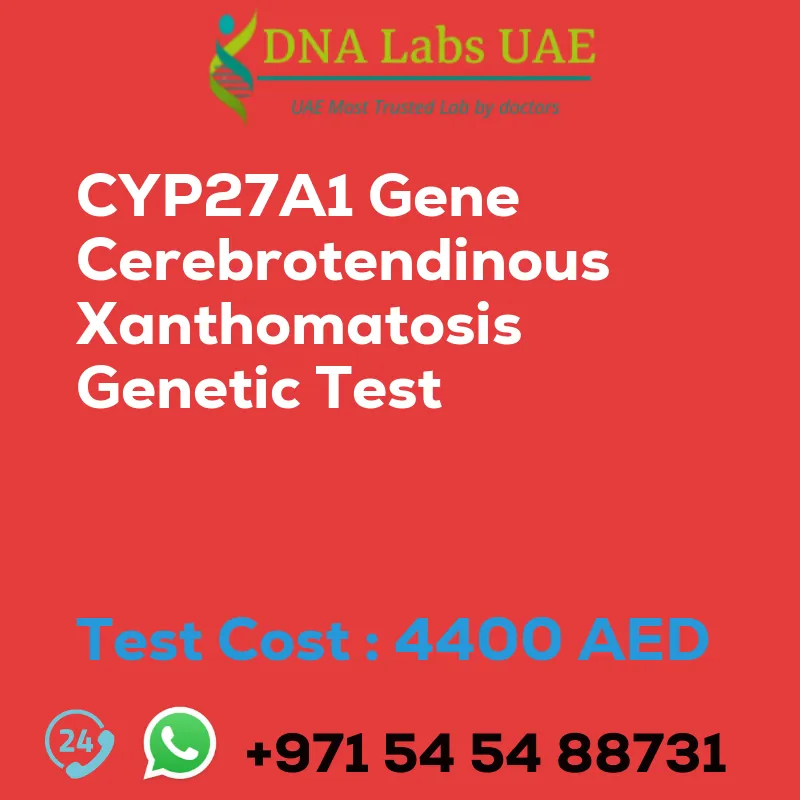CYP27A1 Gene Cerebrotendinous xanthomatosis Genetic Test
Test Name: CYP27A1 Gene Cerebrotendinous xanthomatosis Genetic Test
Components: Blood or Extracted DNA or One drop Blood on FTA Card
Price: 4400.0 AED
Sample Condition: Blood or Extracted DNA or One drop Blood on FTA Card
Report Delivery: 3 to 4 Weeks
Method: NGS Technology
Test type: Neurological Disorders
Doctor: Neurologist
Test Department: Genetics
Pre Test Information: Clinical History of Patient who is going for CYP27A1 Gene Cerebrotendinous xanthomatosis NGS Genetic DNA Test. A Genetic Counselling session to draw a pedigree chart of family members affected with CYP27A1 Gene Cerebrotendinous xanthomatosis.
Test Details
The CYP27A1 gene encodes a protein called sterol 27-hydroxylase, which plays a crucial role in the breakdown of cholesterol in the body. Mutations in the CYP27A1 gene can lead to a rare genetic disorder called cerebrotendinous xanthomatosis (CTX), which is characterized by the accumulation of cholesterol and its derivatives in various tissues, including the brain, tendons, and lenses of the eyes.
CTX can cause a range of symptoms, including cognitive impairment, movement disorders, cataracts, and tendon xanthomas. The severity of symptoms can vary widely, even among individuals with the same genetic mutation.
NGS (next-generation sequencing) genetic testing can be used to identify mutations in the CYP27A1 gene that cause CTX. This type of testing allows for the simultaneous analysis of multiple genes, making it a more efficient and cost-effective way to diagnose genetic disorders.
Early diagnosis of CTX is important, as it allows for early intervention and management of symptoms. Treatment typically involves a combination of medications to reduce cholesterol levels and manage symptoms, as well as dietary changes to reduce the intake of cholesterol and other fats.
Genetic counseling is also recommended for individuals with CTX and their family members, as the condition is inherited in an autosomal recessive pattern. This means that individuals must inherit two copies of the mutated gene (one from each parent) to develop the disorder.
| Test Name | CYP27A1 Gene Cerebrotendinous xanthomatosis Genetic Test |
|---|---|
| Components | |
| Price | 4400.0 AED |
| Sample Condition | Blood or Extracted DNA or One drop Blood on FTA Card o |
| Report Delivery | 3 to 4 Weeks |
| Method | NGS Technology |
| Test type | Neurological Disorders |
| Doctor | Neurologist |
| Test Department: | Genetics |
| Pre Test Information | Clinical History of Patient who is going for CYP27A1 Gene Cerebrotendinous xanthomatosis NGS Genetic DNA Test A Genetic Counselling session to draw a pedigree chart of family members affected with CYP27A1 Gene Cerebrotendinous xanthomatosis |
| Test Details |
CYP27A1 gene encodes a protein called sterol 27-hydroxylase, which plays a crucial role in the breakdown of cholesterol in the body. Mutations in the CYP27A1 gene can lead to a rare genetic disorder called cerebrotendinous xanthomatosis (CTX), which is characterized by the accumulation of cholesterol and its derivatives in various tissues, including the brain, tendons, and lenses of the eyes. CTX can cause a range of symptoms, including cognitive impairment, movement disorders, cataracts, and tendon xanthomas. The severity of symptoms can vary widely, even among individuals with the same genetic mutation. NGS (next-generation sequencing) genetic testing can be used to identify mutations in the CYP27A1 gene that cause CTX. This type of testing allows for the simultaneous analysis of multiple genes, making it a more efficient and cost-effective way to diagnose genetic disorders. Early diagnosis of CTX is important, as it allows for early intervention and management of symptoms. Treatment typically involves a combination of medications to reduce cholesterol levels and manage symptoms, as well as dietary changes to reduce the intake of cholesterol and other fats. Genetic counseling is also recommended for individuals with CTX and their family members, as the condition is inherited in an autosomal recessive pattern. This means that individuals must inherit two copies of the mutated gene (one from each parent) to develop the disorder. |








